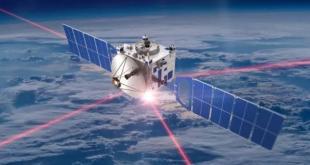by Connor Sattely

SpaceWatch.Global is on a mission: to share with you every single space-tech deal globally, every month. We transparently show who’s included, and who’s not included in our list and explain why.
If the space-tech industry was lumbering towards the launchpad in January ($475m globally), then February was liftoff: space-tech startups raised a whopping $1.7b in funding in February.
The month was bolstered by a massive $932m public-private investment into China’s Shanghai Spacecom Satellite Technology (SSST), but also featured a $355m investment into RocketLabs (US) and a €85m investment into UnseenLabs (France). These megadeals join 30 smaller deals in a historically strong month for spacetech startups worldwide.
Deal highlight
Almost $1b invested in Shanghai Spacecom Satellite Technology (SSST) is a massive investment, likely to represent around 15% of the global total invested in space-tech in 2024. The investment will support SSST in deploying the G60 low Earth orbit constellation of over 12,000 satellites. An initial 108 satellites are expected to be launched this year.
Three points of interest about this deal.
First: it’s massive. “It’s the largest round of funding we’ve seen in Chinese commercial space by far” said Blaine Curcio, Founder of Orbital Gateway Consulting.
Second: it’s considered, globally, an attempt to compete with Elon Musk’s Starlink, with over 12,000 satellites planned to deploy. But Curcio suggests it won’t meet the objective in the short- and medium-term. “China remains pretty far behind the US in terms of technologies that are essential for constellations” Curcio said.
Finally: it’s an interesting development within the space industry in China. “The fact that the Shanghai Government is supporting a large constellation that is not Guowang – the main Chinese NGSO broadband constellation project – means that probably, the Central Government is more open to private involvement” Curcio said. “But SSST is in a precarious position: the Central Government has kept this industry very closed for several years, and there’s no guarantee that its opening up of the industry is going to be a long-term trend.”
The Shanghai government invested through SAIL (Shanghai Aerospace Investment Limited), a government fund, as the primary investor. The Chinese Academy of Sciences also participated through its VC arm, CASSTAR, and CAS Capital. Reuters reported that other investors included Hengxu Capital, backed by Chinese car manufacturer SAIC, and Guosheng Capital, linked to the Shanghai authority.
All deals in January 2024, by $ (descending)
- Shanghai Yuanxin Satellite Technology (SSST) – LEO satellites – raised RMB6.7b.
- Rocket Lab (USA) – end-to-end space services – raised $355m.
- UnseenLabs (France) – maritime situational awareness – raised €85m.
- K2 Space (USA) – large satellite buses for heavy and superheavy rockets – raised $50m.
- Kairos Aerospace (USA) – satellite surveillance for the energy industry – raised $50m.
- RobCo (Germany) – robotics automation for SMEs – raised $42.5.
- Skylo Technologies (USA) – direct-to-device satellite connectivity – raised $37m.
- CesiumAstro (USA) – advanced phased array technology – raised $30m.
- Gilmour Space Technologies (Australia) – launch vehicles/services – raised $AUS 55m.
- LeoLabs (USA) – tracking space debris and objects – raised $29m.
- Elve (USA) – millimeter wave amplifier tech – raised $15m.
- Greenerwave (France) – real-time reconfigurable antennas – raised €15m.
- Synthetaic (USA) – Rapid Automatic Image Categorization (RAIC) – raised $15m.
- Digantara (India) – space situational awareness – raised $12m.
- Spire Global (USA) – space-based data and analytics – raised $10m.
- Northwood Space (USA) – ground stations for satellite communication – raised $6m.
- CubeSpace ACDS (South Africa) – ADCS for nanosatellites – raised ZAR47m.
- Connected (Portugal) – NB-IoT connectivity from space – raised €2m.
- Ecospears (USA) – cleantech for “forever chemicals” – raised $2m.
- Tended (UK) – geofencing for heavy industry – raised £1.5m.
- Aerix Systems (France) – omnidirectional propulsion systems – raised €1.6m.
- Atmos Space Cargo (Germany) – space cargo return for life sciences – raised €1.3m.
- SpaceFields (India) – dual-use rocket propulsion systems – raised Rs65m.
- Jua (Switzerland) – AI “Large Physics Model” – raised $16m.
- Attentive AI (India) – landscaping mapping – raised $7m.
- VisionAnchor (Slovenia) – smart anchoring system – raised €20k.
- World View (USA) – stratospheric exploration – raised an undisclosed amount.
- Hepta Airborn (Estonia) – AI for utility monitoring – raised an undisclosed amount.
- Space Perspective (USA) – tourism space vehicles – raised an undisclosed amount.
- Meteomatics (Switzerland) – weather intelligence – raised an undisclosed amount.
- EtherealX (India) – next-gen launch vehicles/spacecraft – raised an undisclosed amount.
- hiSky (Israel) – private satellite IoT networks – raised an undisclosed amount.
- Mitiga Solutions (Spain) – AI for climate resiliency – raised an undisclosed amount.
Estimating the size of the Space tech industry
SpaceWatch.Global estimates that so far in 2024, 60 space-tech companies have raised a total of €2.02b (~$2.19b).
- January: 25 deals, €442m ($475m)
- February: 35 deals, €1,584m ($1,713m)
The fine print
SpaceWatch.Global includes deals that relate to space-tech and involve equity-based venture funding. One great source of space-tech funding information is the Dealroom/ESA Space Tech Dashboard. As a way of triangulating whether SpaceWatch.Global is accurate relative to industry estimates, each month we compare our list to theirs. This month, there were 20 differences between SpaceWatch.Global’s account of the startup investment ecosystem and Dealroom’s:
- SpaceWatch.Global includes 7 deals unlisted on Dealroom at time of publication: Rocket Lab, EtherealX, Synthetaeic, Shanghai Spacecom Satellite Technology, Kairos Aerospace, Northwood Space, and Elve, together worth about $1.3b.
- SpaceWatch.Global does not include 13 deals listed on Dealroom at time of publication. FlyBotix, Rigitech, Planetary Vision, Agreed Earth, Rural Farmers Initiative, QuasarSat, and NeoStove (grants/accelerator programmes without equity); Interlune (raised in Jan); Remred (corporate acquisition/merger, not VC); TETMET (on suggestion of the founder); Rhombus and MeVitae (not space-tech); and Cemvita, who seems to have raised $6.5m for GoldH2 LLC, a potential subsidiary, however, SpaceWatch.Global could not confirm this. Cemvita did not respond with a comment by time of publication.
Dealroom estimates that so far in 2024, 63 space-tech companies have raised €678m (~$733m). Spacewatch.Global estimates that 60 space-tech companies have raised €2.02b (~$2.19b). We’ve dug into each of these deals. What will they use the funding for? Who are the funders? If you’re an investment wonk and want this information, get in touch: [email protected].
Did we miss your investment? If so, compose an angry e-mail to [email protected]l and we’ll fix the mistake.

Connor Sattely is an entrepreneur and startup advisor working in startup ecosystems all over the world since 2012. His monthly column for SpaceWatch.Global covers the world of venture capital in spacetech. Based in Amsterdam, he’s passionate about supporting startup founders as they grow and build their dream companies. He has launched startups in Switzerland, Uganda, and the Netherlands, and has advised founders in more than 50 countries. You can sometimes find him around Amsterdam playing the tenor saxophone with one of his bands.
 SpaceWatch.Global An independent perspective on space
SpaceWatch.Global An independent perspective on space



